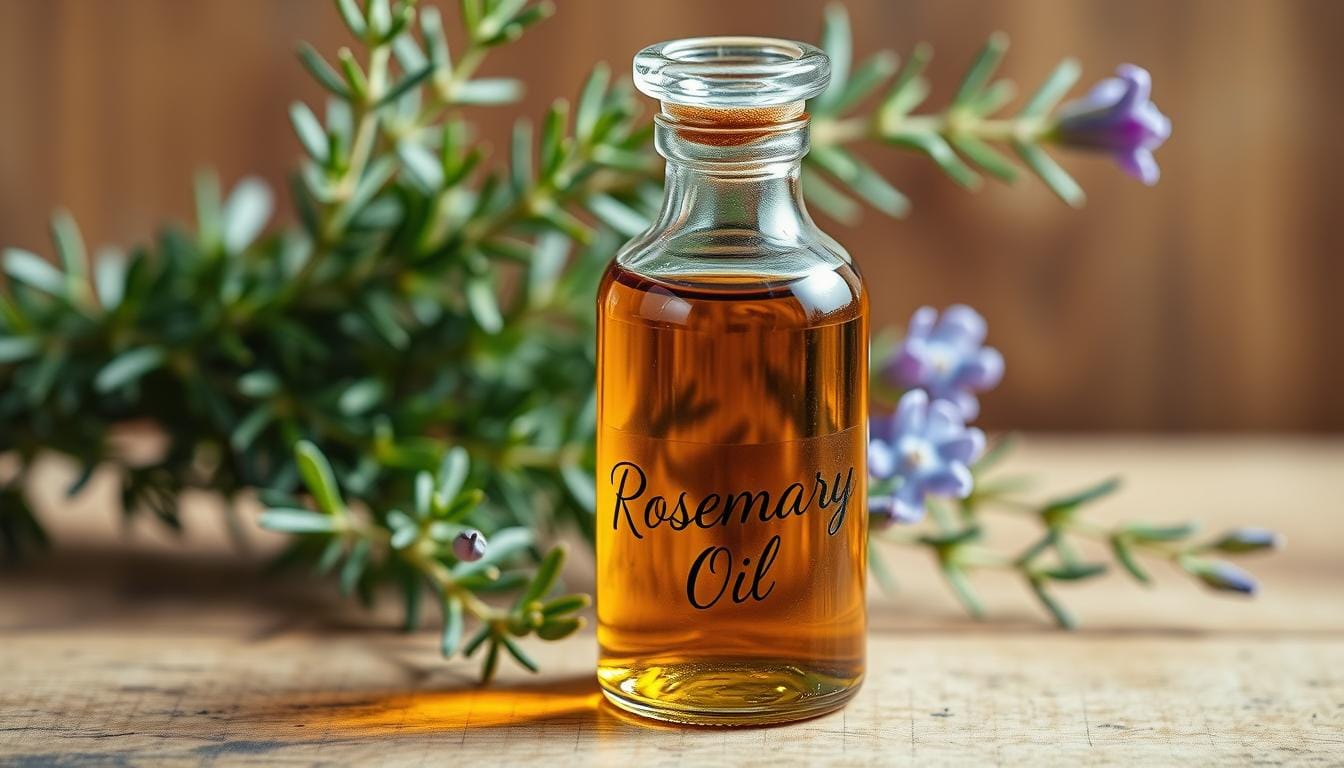Discover the rewarding process of creating your own rosemary oil at home, a natural solution for promoting hair growth. This method is not only effective but also empowers you to take control of your hair care routine.
Rosemary oil has been cherished for centuries, valued for its ability to enhance hair health. Today, it remains a popular choice in natural hair care, offering benefits backed by both tradition and science.
When crafting rosemary oil, it’s crucial to select high-quality ingredients, such as a carrier oil, to ensure optimal results. This simple DIY approach guides you through making a potent solution that nourishes your scalp and fosters a healthy environment for hair growth.
Key Takeaways
- Rosemary oil improves blood circulation to hair follicles, promoting healthy growth.
- Regular use can extend the hair growth phase, leading to longer, fuller hair.
- It inhibits DHT, a hormone linked to hair thinning.
- Homemade rosemary oil is cost-effective and easy to prepare.
- Consistent application is key for noticeable results within months.
Introduction to Rosemary Oil for Hair Growth
Rosemary oil, derived from the fragrant herb Rosmarinus officinalis, has been a cornerstone in natural hair care for centuries. This essential oil is celebrated not only for its aromatic properties but also for its therapeutic benefits, making it a popular choice for those seeking to enhance their hair health.
What is Rosemary Oil?
Rosemary oil is extracted through steam distillation from the leaves of the rosemary plant. It serves as a potent carrier oil, often diluted with other oils for safe application. The oil is rich in compounds like carnosic acid, which contribute to its antioxidant and anti-inflammatory properties.
Historical and Traditional Uses
Since Ancient Greece, rosemary has been revered for its medicinal and cosmetic uses. Traditionally, it was used in folk medicine to stimulate blood flow and improve mental clarity. In hair care, rosemary oil’s ability to enhance circulation and strengthen hair follicles has made it a timeless remedy.
| Component | Details | Benefits |
|---|---|---|
| Botanical Origin | Rosmarinus officinalis | Natural, plant-based source |
| Extraction Method | Steam Distillation | Ensures high potency |
| Traditional Use | Hair and Scalp Treatment | Promotes hair growth, reduces dandruff |
The traditional method involves steeping rosemary leaves in a jar of carrier oil, allowing the infusion to capture the herb’s essence. This simple yet effective process highlights the enduring appeal of rosemary oil in natural beauty rituals.
By understanding the origins and traditional applications of rosemary oil, you can appreciate its value in modern hair care routines. Its benefits, from stimulating the scalp to strengthening hair follicles, make it a versatile and effective natural solution.
Understanding the Benefits of Rosemary Oil
Rosemary oil stands out as a natural solution for enhancing hair health, offering a blend of traditional wisdom and scientific backing. Its ability to nourish and protect your hair makes it a popular choice for those seeking natural hair care solutions.
Promotes Hair Growth and Strength
Rosemary oil is renowned for its ability to stimulate blood circulation in the scalp, which can lead to healthier hair follicles. Studies have shown that regular use can increase hair count and extend the growth phase, resulting in longer and thicker hair. By improving circulation, rosemary oil creates an environment where your hair can grow more vigorously.
Enhances Scalp Health and Reduces DHT
A healthy scalp is the foundation of strong hair. Rosemary oil helps maintain scalp health by reducing dandruff and preventing infections. It also plays a role in lowering DHT levels, a hormone linked to hair thinning. Clinical research supports its effectiveness, with many users reporting noticeable improvements in hair density and overall scalp condition.
By incorporating rosemary oil into your hair care routine, you’re not only promoting hair growth but also contributing to a healthier scalp. This natural approach offers a safe and effective alternative to harsh chemical treatments, making it a valuable addition to your daily regimen.
Step-by-Step Guide: How to Make Rosemary Oil for Hair
Creating your own rosemary oil at home is a straightforward process that requires just a few simple ingredients and some patience. This method allows you to harness the natural benefits of rosemary for promoting hair growth and improving scalp health.
Gathering Your Ingredients and Tools
To get started, you’ll need:
- A clean glass jar with a lid
- 1 cup of dried rosemary leaves
- 2 cups of a carrier oil (such as jojoba, coconut, or argan oil)
- A fine-mesh strainer or cheesecloth
- A dark glass bottle for storage
These tools will help you prepare and store your homemade rosemary oil effectively.
Detailed Process and Safety Tips
1. Begin by combining the dried rosemary leaves and carrier oil in the glass jar. Seal the jar tightly and place it in a sunny spot for 4-6 weeks. This solar infusion method allows the oil to absorb the beneficial compounds from the rosemary leaves.
2. If you prefer a quicker method, you can use a double boiler. Heat the mixture over low heat for 2-3 hours, stirring occasionally. This heat infusion method speeds up the process but requires careful monitoring to avoid overheating.
3. Once the infusion is complete, strain the mixture through a fine-mesh strainer or cheesecloth into the dark glass bottle. Discard the solids and store the oil in a cool, dark place to preserve its potency.
| Component | Details | Benefits |
|---|---|---|
| Carrier Oil | Jojoba, Coconut, or Argan Oil | Maintains scalp health and enhances oil absorption |
| Infusion Method | Solar or Heat Infusion | Effectively extracts beneficial compounds from rosemary |
| Storage | Dark Glass Bottle | Protects from light and extends shelf life |
4. Before using your homemade rosemary oil, always dilute it with a carrier oil and perform a patch test to ensure there are no adverse reactions. This step is crucial for maintaining scalp health and avoiding irritation.
5. Store your rosemary oil in a cool, dark place to maintain its freshness. The oil can last for several months when stored properly, making it a convenient addition to your hair care routine.
By following these steps and safety tips, you can create a high-quality rosemary oil that promotes hair growth and supports a healthy scalp. Regular use can lead to noticeable improvements in hair thickness and overall health.
DIY Rosemary Oil Recipes for Hair Growth
Enhance your hair care routine with these simple and effective DIY recipes. Discover how to create nourishing blends that promote healthy hair growth and a vibrant scalp.
Basic Rosemary Hair Oil Recipe
To craft a basic rosemary hair oil blend:
- Combine 1 cup of dried rosemary leaves with 2 cups of jojoba oil in a clean glass jar.
- Let it infuse for 4-6 weeks in sunlight or use a double boiler for 2-3 hours.
- Strain the mixture and store it in a dark glass bottle.
This method ensures a potent blend rich in antioxidants and anti-inflammatory properties.
Rosemary & Lavender and Peppermint Blends
For enhanced benefits, try these variations:
- Rosemary and Lavender Blend: Add a few drops of lavender oil for a calming effect and improved hair growth.
- Rosemary and Peppermint Blend: Incorporate peppermint oil to stimulate blood flow and invigorate your scalp.
Each blend offers unique benefits, from reducing dandruff to boosting hair strength.


Timing is crucial for optimal potency. Allow the infusion to steep for the recommended minutes to ensure the oil captures all beneficial compounds. Proper care and use of each ingredient will yield the best results for your hair growth journey.
DIY Rosemary Oil as a Hair Serum with Argan and Castor Oils
Take your hair care routine to the next level with a luxurious hair serum. Unlike regular oil treatments, serums are more concentrated, targeting specific concerns like growth and nourishment. This section explores two premium blends: Rosemary & Argan Oil Hair Serum and Rosemary & Castor Oil Hair Growth Blend.
Rosemary & Argan Oil Hair Serum Recipe
Create a nourishing serum by mixing:
- 2 tablespoons of argan oil
- 3 drops of rosemary essential oil
- 1 teaspoon of vitamin E oil
Gently massage the serum into your scalp using circular motions to stimulate blood flow. Leave it on for 30 minutes before shampooing for optimal results.
Rosemary & Castor Oil Hair Growth Blend
Combine 1 tablespoon of castor oil with 2 drops of rosemary essential oil. Apply this blend 1-2 times a week for enhanced hair growth. Castor oil’s thickness promotes hair strength, while rosemary oil stimulates follicles.
“Natural ingredients like rosemary and castor oil offer a powerful, chemical-free solution for hair growth.”
Incorporate these serums into your shampoo routine for a spa-like experience at home. Use the argan serum as a pre-shampoo treatment or mix a few drops with your shampoo for added nourishment. Regular use can lead to thicker, healthier-looking hair in a few months.
Infusing and Storing Your Homemade Rosemary Oil
Creating homemade rosemary oil involves more than just mixing ingredients. Proper infusion and storage techniques are essential to preserve its potency and ensure long-term effectiveness for hair growth.
Effective Solar Infusion Technique
The solar infusion method is a popular choice for extracting the essence of dried rosemary. Place your glass jar on a sunny windowsill for 4-6 weeks. This slow process allows the oil to absorb the beneficial compounds from the rosemary, enhancing its ability to promote hair health and growth.
Using dried rosemary is crucial for avoiding spoilage and ensuring the oil’s health benefits. Fresh rosemary contains more moisture, which can lead to mold growth during the infusion process. Dried rosemary provides a consistent and reliable option for homemade oil hair growth solutions.
Storage Tips for Prolonging Oil Freshness
After straining, store your homemade rosemary oil in a dark glass bottle with an airtight lid. Keep it in a cool, dark place to protect it from light and heat, which can degrade the oil’s quality. Proper storage extends the shelf life, maintaining the oil’s effectiveness for hair growth.
| Storage Aspect | Details | Benefits |
|---|---|---|
| Container Type | Airtight Dark Glass Bottle | Protects from light and contamination |
| Storage Location | Cool, Dark Place | Preserves oil potency and freshness |
| Strain Method | Fine-Mesh Strainer/Cheesecloth | Removes solids, prevents spoilage |
By following these steps, you can enjoy your homemade rosemary oil for several months while reaping its benefits for hair health and growth. This natural, chemical-free process ensures the purity and effectiveness of your rosemary essential oil.
Incorporating Rosemary Oil into Your Daily Hair Care Routine
Incorporating rosemary oil into your daily hair care routine can be simple and effective. Regular use can lead to healthier hair and a stronger scalp. Here are some easy ways to make rosemary oil a part of your hair care regimen.
Application Techniques for Maximum Benefit
There are several ways to apply rosemary oil for optimal results. One popular method is a direct scalp massage. Use your fingertips to gently massage the oil into your scalp in circular motions. This helps improve blood flow and stimulates hair follicles. You can also mix rosemary oil with olive oil for a nourishing hair treatment. Simply combine a few drops of rosemary oil with a tablespoon of olive oil and apply it to your hair, focusing on the ends.
Precautions and Dilution Guidelines
Before using rosemary oil, it’s important to dilute it with a carrier oil like olive oil or coconut oil. A general ratio is 5 drops of rosemary oil to 1 tablespoon of carrier oil. This helps prevent irritation and ensures safe use. Perform a patch test before applying it widely. Consistency is key for seeing results, so aim to use the oil 2-3 times a week.
By incorporating rosemary oil into your routine, you can promote hair growth and maintain a healthy scalp. Regular use, combined with proper application techniques, can lead to noticeable improvements in hair health and appearance.
Exploring Additional Uses and Variations of Rosemary Oil
Rosemary oil is a versatile ingredient that extends beyond hair care, offering benefits for skin care and aromatherapy. Its refreshing scent and natural properties make it a valuable addition to various personal care products.
Alternative Uses in Skin Care and Aromatherapy
In skin care, rosemary essential oil can soothe and moisturize, reducing inflammation and improving circulation. It’s also a popular choice in aromatherapy for its invigorating aroma, which can enhance mental clarity and reduce stress.
When combined with coconut oil, rosemary creates a multi-purpose product. Here’s a simple recipe:
- 1 tablespoon of coconut oil
- 3 drops of rosemary essential oil

This blend can be adapted for different routines, offering a natural solution for overall wellness. Whether for skin health or mental relaxation, rosemary oil’s effectiveness shines through.
Conclusion
In conclusion, incorporating natural ingredients like jojoba oil into your hair care routine offers a simple yet effective way to promote hair follicle health and reduce dandruff. By embracing a DIY approach, you can create nourishing blends that benefit both your skin and scalp. Regular use of these natural solutions, combined with safe practices, can lead to noticeable improvements in hair health and appearance. Remember, consistency is key, so aim to use these remedies 2-3 times a week for the best results. Take charge of your beauty regimen with these easy, chemical-free methods and enjoy the rewards of healthier hair and skin.
FAQ
What are the benefits of using rosemary oil for hair growth?
Can I use rosemary essential oil directly on my hair?
How long does it take to see results from using rosemary oil for hair growth?
Can I add rosemary oil to my shampoo?
What is the best carrier oil to mix with rosemary essential oil for hair?
How do I store homemade rosemary oil to keep it fresh?
Can I use dried rosemary instead of fresh for making rosemary oil?
Is rosemary oil safe for all hair types?
Can I use rosemary oil more than once a day for faster hair growth?
Does rosemary oil help with dandruff and scalp irritation?
Can I combine rosemary oil with other essential oils for better results?
How often should I massage rosemary oil into my scalp?
Can I leave rosemary oil on my hair overnight?
Is rosemary oil suitable for colored or chemically treated hair?
Can I make rosemary oil at home without any special equipment?
Does rosemary oil have any side effects?
Can I use rosemary oil for skin care as well?
How long should I wait before washing my hair after applying rosemary oil?
Can I use rosemary oil on my beard or mustache?
Does rosemary oil expire?
Can I add rosemary oil to my conditioner?
Is rosemary oil safe for children?
Can I use rosemary oil for aromatherapy?
Does rosemary oil help with split ends?
Can I use rosemary oil for a scalp massage?
How much rosemary oil should I use for each application?
Can I make rosemary oil using a different carrier oil?
Does rosemary oil have a strong scent?
Can I use rosemary oil for dry hair?
Does rosemary oil help with hair loss?
Can I use rosemary oil on my scalp if I have psoriasis?
Does rosemary oil darken hair?
Can I use rosemary oil for an itchy scalp?
Does rosemary oil expire if not used for a long time?
Can I use rosemary oil on damaged hair?
Does rosemary oil have any benefits for the skin?
Can I use rosemary oil in a hair mask?
Does rosemary oil help with frizzy hair?
Can I use rosemary oil for curly hair?
Does rosemary oil help with scalp infections?
Can I use rosemary oil for beard growth?
Does rosemary oil help with split ends?
Can I use rosemary oil for a scalp massage?
How much rosemary oil should I use for each application?
Can I make rosemary oil using a different carrier oil?
Does rosemary oil have a strong scent?
Can I use rosemary oil for dry hair?
Does rosemary oil help with hair loss?
Can I use rosemary oil on my scalp if I have psoriasis?
Does rosemary oil darken hair?
Can I use rosemary oil for an itchy scalp?
Does rosemary oil expire if not used for a long time?
Can I use rosemary oil for damaged hair?
Does rosemary oil have any benefits for the skin?
Can I use rosemary oil in a hair mask?
Does rosemary oil help with frizzy hair?
Can I use rosemary oil for curly hair?
Does rosemary oil help with scalp infections?
Can I use rosemary oil for beard growth?
Source Links
- How To Make and Use Rosemary Oil For Hair Growth – https://www.100percentpure.com/blogs/feed/how-to-make-rosemary-oil-for-hair-growth?srsltid=AfmBOopNVMdQ909FlyZqu3VCqqKn8_QxYDo2i0z2lTW7ItkWa05KodQc
- DIY Rosemary Hair Water for Growth | Before and After – https://www.tidbits-cami.com/rosemary-hair-water/
- How to properly use rosemary oil for hair growth? – https://miiskin.com/hair-loss/how-to-use-rosemary-oil-for-hair-growth/
- Rosemary Oil for Hair: Growth, Uses, and Benefits – https://www.healthline.com/health/rosemary-oil-for-hair
- Rosemary Oil for Hair Growth: A Comprehensive Guide – https://hairgp.co.uk/rosemary-oil-for-hair-growth-a-comprehensive-guide/
- How To Make and Use Rosemary Oil For Hair Growth – https://www.100percentpure.com/blogs/feed/how-to-make-rosemary-oil-for-hair-growth?srsltid=AfmBOopA4wLxExYot3l-2EdS0A9Me4P2_aSg6avIxKsXNpxUIpTMt0XL
- How to Make Rosemary Oil for Hair Growth – https://burlybands.com/blogs/news/how-to-make-rosemary-oil-for-hair-growth
- How To Make and Use Rosemary Oil For Hair Growth – https://www.100percentpure.com/blogs/feed/how-to-make-rosemary-oil-for-hair-growth?srsltid=AfmBOooY7tHR-uP362Y8tsMqaFVn1yKa7qpFQ6D2256FvRusNradbNfx
- Revitalise your locks: how to make a rosemary scalp and hair oil – Formula Botanica – https://formulabotanica.com/how-to-make-rosemary-scalp-oil/
- How to Make Rosemary Oil for Hair Growth: The Essential Guide! – https://cosmeticworld.ca/blogs/articles/how-to-make-rosemary-oil-for-hair-growth?srsltid=AfmBOorkUKCNnNTbdb-j5UqFto5DHUwv2nW0N308FbjZl4FVQMkILu-G
- How To Make and Use Rosemary Oil For Hair Growth – https://www.100percentpure.com/blogs/feed/how-to-make-rosemary-oil-for-hair-growth?srsltid=AfmBOooOwPUjrjDILEu7-Jr5PFh3hgysxaTjmOfJU1UPdAczuefO_2N4
- Natural Hair Growth Oil – https://wellnessmama.com/remedies/natural-hair-growth-oil/
- How To Make and Use Rosemary Oil For Hair Growth – https://www.100percentpure.com/blogs/feed/how-to-make-rosemary-oil-for-hair-growth?srsltid=AfmBOoq3Bl6U4awlxZFZHVq8K1FraQ–dXLzpGAu18zCUIW1ro7yRhid
- How to Make Rosemary Oil for Hair Growth: The Essential Guide! – https://cosmeticworld.ca/blogs/articles/how-to-make-rosemary-oil-for-hair-growth?srsltid=AfmBOooaZMsImMFI1oNSErwnzoZKLZOOLDGd43r5gunx_P_CQ7MVqg35
- Easy Homemade Rosemary Hair Growth Oil Recipe (DIY Natural) – https://www.naturalbeautyandmakeup.com/2024/07/natural-homemade-rosemary-hair-growth-oil-recipe-diy.html
- How To Make and Use Rosemary Oil For Hair Growth – https://www.100percentpure.com/blogs/feed/how-to-make-rosemary-oil-for-hair-growth?srsltid=AfmBOorHzVHz7KSyzLFHxTk65PFWq-eCLmrpC0D4GgrEp_wdfh3yCgE0
- How To Make and Use Rosemary Oil For Hair Growth – https://www.100percentpure.com/blogs/feed/how-to-make-rosemary-oil-for-hair-growth?srsltid=AfmBOora25uptgXtUnVZ0M_oqZhi0fiuMAfNQOvWazTLrzv5tcCzVXeX
- Can Rosemary Oil Actually Grow Your Hair? Experts Weigh In – https://www.elle.com/beauty/hair/a38603963/rosemary-oil-for-hair/
- Rosemary Oil is Proven to Regrow Hair as Effectively as Rogaine—Here’s How to Use It and a DIY Recipe – https://www.firstforwomen.com/beauty/hair/how-to-make-rosemary-oil-for-hair
- How To Make and Use Rosemary Oil For Hair Growth – https://www.100percentpure.com/blogs/feed/how-to-make-rosemary-oil-for-hair-growth?srsltid=AfmBOoqocpjIN_yci_mMUXcxYn9qVleOU-K2ecoOkfogmcanxUB0yivc
- How to Dilute Rosemary Oil for Hair Growth: 2025 Guide – https://aventusclinic.com/how-to-dilute-rosemary-oil-for-hair/
- Rosemary for Hair Growth: Benefits, Uses, and DIY Recipes – https://www.earthraga.com/blogs/news/rosemary-for-hair-growth?srsltid=AfmBOoo_ijKnUrPJRseB6C5O3tBiTfYcThv21ANoUHnJWuIbuQ2mtGRJ
- DIY: How to Make Diluted Rosemary Oil for Hair – https://replenhair.com/blogs/community/how-to-make-diluted-rosemary-oil-for-hair?srsltid=AfmBOoot0lL-cILWc967WhuitabicxZjBphQULmrNtBucX_m6Fbt3Dfw
- How To Make Rosemary Oil at Home – https://timesofagriculture.in/how-to-make-rosemary-oil-at-home/

Just tried the Dino Game after reading this and wow – I see why it’s global! The Dino Game’s perfect for quick brain breaks during work.